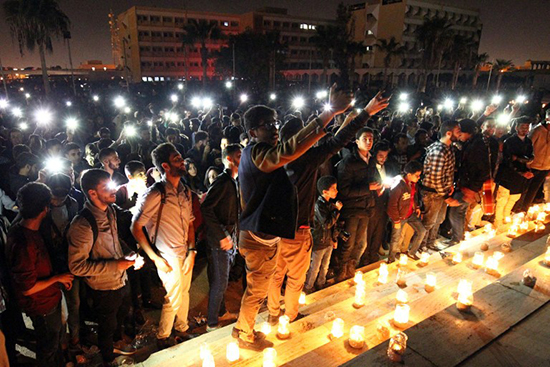New York, April 4, 2017–Security forces in Benghazi should stop harassing AFP photojournalist Abdullah Doma and ensure that he can work safely and without fear of reprisal, the Committee to Protect Journalists said today. Security forces in the eastern Libyan city have twice detained Doma in the last week, according to AFP and other news reports.
Security forces detained Doma at his home on March 28 after the journalist photographed an “Earth Hour” event the Ministry of Religious Endowments and Islamic Affairs had criticized as “offensive” to Islam because it allowed mixing of men and women, according to press reports.
The photographer was released some 24 hours later, but officers from the Interior Ministry’s Department of Homeland Security detained him again on April 1, according to The Libya Herald, an English-language news website. According to that report, members of rival security forces disagreed over who should take him into custody.
Doma was again released the following day, April 2, according to AFP, but was required to return to the Interior Ministry’s counterterrorism unit yesterday. There officers confiscated his identification card and instructed him to sign a series of documents without allowing him to read them, according to his employer. Libyan special forces from the eastern authority intervened and allowed the journalist to leave the building, AFP reported.
The news agency cited an unnamed official as saying that high-level authorities in eastern Libya had ordered all criminal proceedings against Doma to be dropped, but that some members of the security services appeared to be “out of control.”
“His situation remains highly uncertain,” AFP reported yesterday.
“We call on security forces in eastern Libya to stop harassing photojournalist Abdullah Doma and allow him and all journalists to work freely,” CPJ Program Director Carlos Lauría said. “Journalists in Libya take immense risks every day. Security forces should be there to protect them, not to terrorize them further.”
Libya, now under the control of rival governments based in the capital Tripoli and the eastern city of Tobruk, remains a dangerous place to be a journalist. Last month armed men attacked the Tripoli office of the Libyan TV channel Al-Nabaa and set the building on fire, CPJ reported at the time. Authorities in the eastern city of Tobruk on February 27 took the radio station Al-Wasat’s transmitter and sealed its office, CPJ reported at the time.
Authorities in both regions of Libya have arrested journalists, according to CPJ research. Continued fighting in the country continues to pose severe risk of abduction, injury, or death to journalists covering the conflict.
